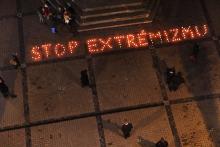Marian Kotleba
Democracy Digest: Anti-Vaxxers Needled
The predominantly anti-vax protesters received onsite support and words of encouragement from several opposition politicians, including far-right leader Marian Kotleba from the People's Party - Our Slovakia (LSNS). He oversaw the demonstration with MPs from the leftist SMER-SD party, prompting talk of future cooperation between the two parties.
- Read more about Democracy Digest: Anti-Vaxxers Needled
- Log in to post comments
Democracy Digest: Slovakia’s Infectious ‘Infodemic’
In a country where polls show more than half of people believe conspiracy theories and two-thirds do not trust state institutions, hoaxes and fake news have an infectious power.
Live: Coronavirus Updates
Why Populists Love the Pandemic
Roma: Europe's Neglected Coronavirus Victims
Hungary 'No Longer a Democracy' After Coronavirus Law
Don’t Underestimate Slovakia’s Neo-Nazi Threat
"Namely because of the situation we've seen since 2016, when a party supposedly built on a neo-Nazi ideology entered parliament," said Vilagi from Comenius University in Bratislava.
She was referring to the far-right Kotleba - People's Party Our Slovakia (LSNS), which is polling in second or third place ahead of the country's February 29 parliamentary election.
- Read more about Don’t Underestimate Slovakia’s Neo-Nazi Threat
- Log in to post comments
Slovak Election Dilemma: To Talk or Not to Talk to Fascists?
Four years later, with LSNS polling around 14 per cent ahead of a parliamentary election at the end of February, that question has a new urgency.
The party's rise has polarised Slovak society and divided opinion among commentators, experts and political leaders about whether to sup with the devil — and if so, with how long a spoon.
Slovakia, 2019: The Year of President Zuzana Caputova
"She brought a spirit of positive energy that has broken the bad mood that Slovaks have had for a long time," Zuborova, an analyst at the Bratislava Policy Institute think tank, told BIRN in an interview.
"She also represented a new hope that Slovakia might take a different direction than the rest of Central Europe."
The Affluent Slovak Town Where Neo-Fascism is Vogue
In recent European Parliament elections, 16 per cent of voters in the Hlohovec district backed the People's Party Our Slovakia (LSNS), widely seen as neo-fascist. In one of the town's electoral districts, support for the party topped 30 per cent.
Slovak Village Destroyed by Nazis Finds Allure in Fascism
Maslen's parents, both 30 years old, were among 64 people killed by Nazi soldiers on a freezing Sunday morning in January 1945, a warning to others of the fate that awaited them should they be brave enough to aid the anti-fascist partisans of the Slovak National Uprising.
The youngest victim was 14 months old, a boy shot dead in the arms of his 11-year-old sister.
Slovak Anti-Fascists Divided Over How to Fight Extremism
In one camp are those who take the battle to the streets, organising noisy protests and engaging in direct action. This is the traditional "Antifa" model favoured by more militant campaigners.
Disinformation Nation: The Slovaks Fighting in Defence of Facts
But while Slovak police have set up a Facebook page to debunk hoaxes and civil society organisations try to explain the dangers of information wars and widespread media illiteracy, some social media users are taking matters into their own hands.
Resentments Fester in Slovakia’s ‘Land of Nothing’
Some days Adrian Lachata ponders how life would have turned out if he had never left Svidnik.
The 32-year-old engineer would not have graduated from the most prestigious technical faculty in the Czech Republic, where he has lived for the past 11 years since moving from the industrial town in Slovakia's northeast where he grew up.
- Read more about Resentments Fester in Slovakia’s ‘Land of Nothing’
- Log in to post comments










